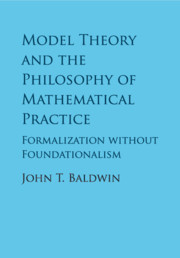Book contents
- Frontmatter
- Dedication
- Contents
- List of Figures
- Acknowledgments
- Introduction
- PART I REFINING THE NOTION OF CATEGORICITY
- PART II THE PARADIGM SHIFT
- PART III GEOMETRY
- PART IV METHODOLOGY
- 12 Formalization and Purity in Geometry
- 13 On the Nature of Definition: Model Theory
- 14 Formalism-Freeness (Mathematical Properties)
- 15 Summation
- References
- Index
15 - Summation
from PART IV - METHODOLOGY
Published online by Cambridge University Press: 19 January 2018
- Frontmatter
- Dedication
- Contents
- List of Figures
- Acknowledgments
- Introduction
- PART I REFINING THE NOTION OF CATEGORICITY
- PART II THE PARADIGM SHIFT
- PART III GEOMETRY
- PART IV METHODOLOGY
- 12 Formalization and Purity in Geometry
- 13 On the Nature of Definition: Model Theory
- 14 Formalism-Freeness (Mathematical Properties)
- 15 Summation
- References
- Index
Summary
We review here the main themes of the book and summarize the argument. Our principal claim is that the process of formalization and the use of fully formalized theories is a useful tool both in the philosophy of mathematical practice and in mathematics.We argued by exhibiting such uses.
Feferman addresses the connection of logic and mathematics as follows:
Logic attempts to provide us with a theoretical analysis of the underlying nature of mathematics as physics provides us with a theoretic analysis of the underlying nature of the physical world…. In the case of logic, this theoretical analysis is supposed to explain what constitutes the underlying content of mathematics and what is its organizational and verificational structure. [Feferman 1978]
Without engaging ontological issues, we take the underlying content to be the corpus of mathematics: definitions, theorems, programs. But we try to show how logic and the formal method provide not only a verificational structure, namely proof in first order logic, but also through the methods of modern model theory a tool to organize the structure of mathematics. In fact, our account of the verificational structure is minimal. The coherence of the entire project of finding formalizations of specific mathematical topics in first order theories, which purport to preserve meaning, depends on the completeness theorem. But formal proof itself, with its permitted redundancy and necessary focus on small points, does not represent a faithful idealization of actual mathematical proofs. Moreover, the attempt to achieve verification by a global foundation leads to uninformative coding. However, by providing the axioms and primitive notions for local areas of mathematics, formalization can focus on the actual ideas of the particular subject. The paradigm shift (page 2) from the study of properties of logics to a systematic search for virtuous properties of theories enables the use of model theoretic principles to choose useful axiomatizations (Chapter 6).
We specified our investigation dealt with the philosophy of mathematical practice (page 5) to emphasize our study of the activities of mathematicians and the corpus of mathematics. Our first two theses read:
Contemporarymodel theory makes formalization of specificmathematical areas a powerful tool to investigate both mathematical problems and issues in the philosophy of mathematics (e.g. methodology, axiomatization, purity, categoricity, and completeness).
- Type
- Chapter
- Information
- Model Theory and the Philosophy of Mathematical PracticeFormalization without Foundationalism, pp. 312 - 316Publisher: Cambridge University PressPrint publication year: 2018



